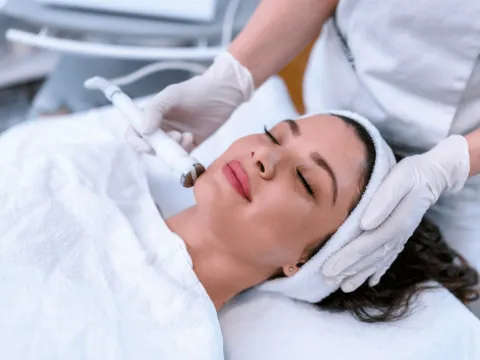- AdventHealth

Choose the health content that’s right for you, and get it delivered right in your inbox.
Whether you’re looking to treat scars and pigmentation issues or are seeking skin rejuvenation or hair or tattoo removal, laser treatment may be a good option. Our expert Charis Nunez, APRN, an AdventHealth plastic surgery nurse practitioner in Orlando, is breaking down the details of laser treatment. Keep reading to discover the risks, benefits and whether laser treatment may be a good fit for your needs.
How Laser Treatment Works
“A laser treatment uses concentrated beams of light to target specific areas of the body for various medical and cosmetic purposes,” explains Charis. “The laser precisely removes the targeted skin, one layer at a time, and stimulates the growth of new skin.”
Laser treatment aims to help you get back to feeling like your best self as quickly as possible. “We use leading-edge, versatile laser systems from Sciton for a range of treatments, from skin resurfacing to acne scar reduction, wrinkle treatment and vascular lesion removal,” shares Charis. “Its advanced technology allows providers to customize treatments for each patient’s unique skin type and goals, offering effective, targeted results with minimal downtime.”
Laser treatment can benefit people with specific skin concerns, including scars, wrinkles, pigmentation issues and acne, but it’s also worth considering if you’re seeking hair removal, tattoo removal or skin rejuvenation.
What to Know Before Laser Treatment
While laser treatment is an effective approach to treat a variety of dermatologic conditions, it’s important to know that results can vary based on skin type, condition and lifestyle. “Proper preparation and following instructions before and after treatment are key to a successful outcome,” explains Charis.
We recommend scheduling a consultation before your treatment to discuss your condition and the medications and skincare products you use with your health care provider. Not all skin types and conditions respond the same way, and you may need to stop using certain medications or products leading up to your treatment.
Benefits of Laser Treatment
Laser treatments can offer a variety of benefits, including:
- Increased collagen production
- Precise targeting, reducing damage to surrounding tissue
- Reduced appearances of scars, wrinkles and hyperpigmentation
- Quick procedure times and manageable recovery
“Our office provides a variety of laser treatments, including skin resurfacing, hair removal, pigmentation correction, acne scar treatment and vascular lesion treatment,” Charis shares. “We’ll also offer customizable options based on our patient’s goals and skin type.”
Potential Risks of Laser Treatment
Additionally, it’s important to know the potential risks associated with laser treatment. “Laser treatments come with some risks and can be quite harmful if not performed by a licensed health care professional,” explains Charis.
Potential risks can include:
- Hyperpigmentation or hypopigmentation
- Redness
- Scarring
- Swelling
“Choosing a qualified provider and following pre- and post-care instructions can help minimize these risks.”
Laser Treatment Recovery
“Your recovery time will vary depending on the type of treatment and the required depth of treatment,” she continues. “You may experience redness, swelling or minor peeling for a few days, and deeper treatments can take a week or more to heal fully.”
To support your healing, avoid sun exposure during your recovery period and follow a gentle skincare routine, avoiding rough exfoliants until you’ve healed completely.
The Best Time of Year for Laser Treatment
If you’re new to laser treatments, you may not realize that people are more inclined to get treatments during certain times of the year, specifically the fall and winter months.
Laser-treated skin is highly sensitive while it’s healing and it can be especially difficult to avoid the sun in the summertime when UV rays are at their highest.
“Fall and winter are ideal for laser treatments because patients are less likely to be exposed to intense sunlight, which can affect healing and increase the risk of pigmentation issues,” explains Charis. “The cooler weather also helps protect treated areas as the skin recovers.”
Compassionate Skincare Starts at AdventHealth
Our dedicated plastic and reconstructive surgery team will provide the expert care you need to look and feel your best. Schedule a consultation today to discover if you’re a good candidate for laser treatment and learn more about our program.



